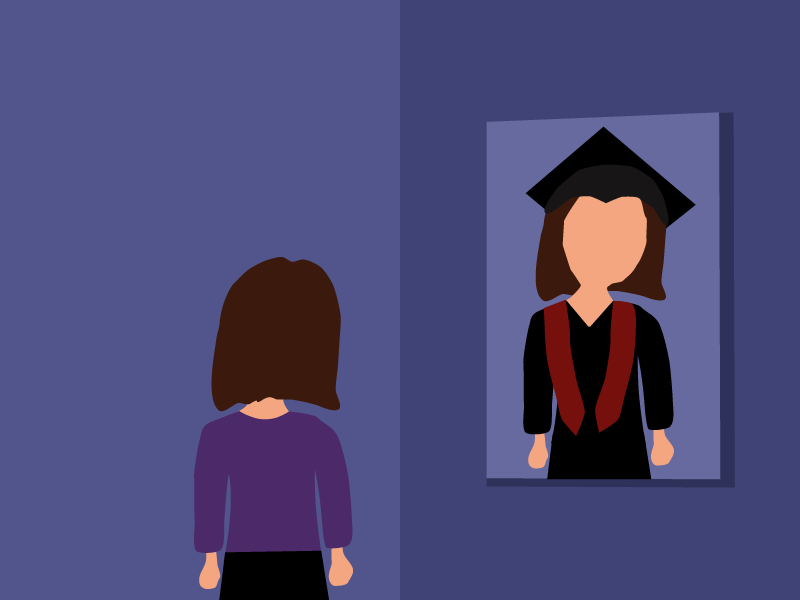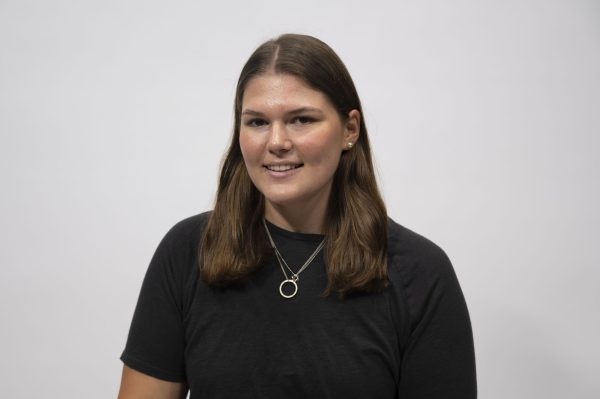Life comes with plenty of transitions, some unavoidable and many harder than others. Going from kindergarten to first grade feels minor now, even though it felt like the entire world to us then. Before we knew it, we were walking out of our high schools for the last time, diploma in hand, time for us to tackle the next big obstacle ahead: college.
From K-12, our weeks were structured for us — 8 a.m. to 3 p.m. at school, then clubs, sports or work, then we went home and did our homework. But now, my schedule feels like class timings are determined by throwing darts at a dartboard, and my aim feels off. Some days, I’m rushing across campus from one class to another with barely 10 minutes to spare, and other days, I have a random three-hour long gap between classes.
At the beginning of the semester, everything felt so overwhelming all the time, and honestly, it still does. We’re nearing the end of the semester, yet I still feel like I just started yesterday. Thankfully, I’ve started to find a rhythm in the chaos of it all, but I’m nowhere near where I need to be.
But that’s okay. College is for learning how to be an adult, and even if you feel behind in some aspects, like socializing, you may be ahead in others, like time management. Find your strengths, identify your weaknesses and learn how to boost yourself all-around.
Transitioning to college can be much harder for some students than others. Not every student has access to resources or support — especially in that key phase between receiving the acceptance letter and graduating from high school. For those who have to move far from home, especially international students, the adjustment can be quite a shock.
AP courses and dual enrollment can help ease students into a higher level of academic rigor from a “normal” high school course to a college-level course, but not all students have access to these courses. Despite having the aforementioned access to AP and dual enrollment classes, nothing could’ve prepared me for the amount of studying we are expected to do once on campus.
Since there’s more content to cover in a college course and less time, everything can feel so rushed. According to the Learning Center of California State Polytechnic University, Humboldt, it’s recommended to spend two to three additional study hours per credit the class gives a week. For the average full-time student course load of 16 credits, that’s 32 to 48 extra hours of studying on top of the time spent in class. While somewhat understandable, it feels unrealistic to ask of students. Finding that time can be difficult, not counting extra time spent on classes a student may struggle in. We’re not machines; we’re young adults.
Dorm life can be pretty rough, too. I’ve heard horror stories of inconsiderate roommates, and some students seem to have interesting perspectives on what constitutes responsibility in communal living spaces. It can also be difficult to make your room feel like your own, and some days, it feels more like a hotel room than a nine-month-long living arrangement (for some students, it literally is).
Balancing a social life has also been a difficult challenge. Some of my closest friends live states away, and I miss seeing them, especially when I used to get to see them nearly every day. Making friends can come less naturally, considering you don’t see the same rotation of people five days a week. Some days, I don’t even see my neighbors. Most of the friends I’ve made have resulted from clubs or living near each other, not classes.
While advising services have been personally helpful in navigating my academic path, expecting students to suddenly know what to do with their lives feels like too much to ask, especially from such a relatively young age. At Northeastern, 50% of students change their major at least once. For the roughly one-third of students who come in undeclared, the Explore Program gives them options to try out various majors, but you’re encouraged to declare as soon as you can.
Not only are you expected to declare, but it feels like you’re supposed to present your entire life plan — a near-impossible task in the uncertainty of today’s world and the job market. Some fields are more competitive than others, and unfortunately, not everyone can follow their dream career.
At the end of the day, I think the transition to college is a necessary part of growing up. It’s a bridge from being a kid into being an adult — a time to learn how to balance your work with your personal life, but that doesn’t make the transition any easier. More high schools and colleges should offer support and more understanding should be given to those who are struggling to adjust.
While Northeastern has college transition resources, including academic advising and mental health support through University Health and Counseling Services, it feels stretched thin, especially at high-need times, such as the beginning of the year and finals season. The resources don’t feel well-advertised, either, and I think Northeastern needs to improve its outreach to students in this regard.
As my first semester comes to a close, I’ve found myself looking back on things that did and didn’t work. Setting a routine schedule is crucial. I made a spreadsheet for all my assignments, outlining the classes, due dates and details of the work, and it has kept me in check. Talk to others who live in your residence halls and reach out to your professors when you need help.
Perhaps most importantly, join clubs and explore your interests. Maybe you’ll find another part of yourself you didn’t know about before or find that you enjoy an activity a lot more than you expected — and maybe even want to make it part of your career.
Things are different in the adult world, and some days, it’s hard to accept that I’ll never go back to sitting on the alphabet rug.
Antaine Anhalt is a first-year communication studies major. He can be reached at anhalt.a@northeastern.edu.
The Huntington News is dedicated to serving the Northeastern University community with original, professional reporting and creating an environment in which student journalists can learn from one another. Support an independent, free press at Northeastern University with your donation today.


















